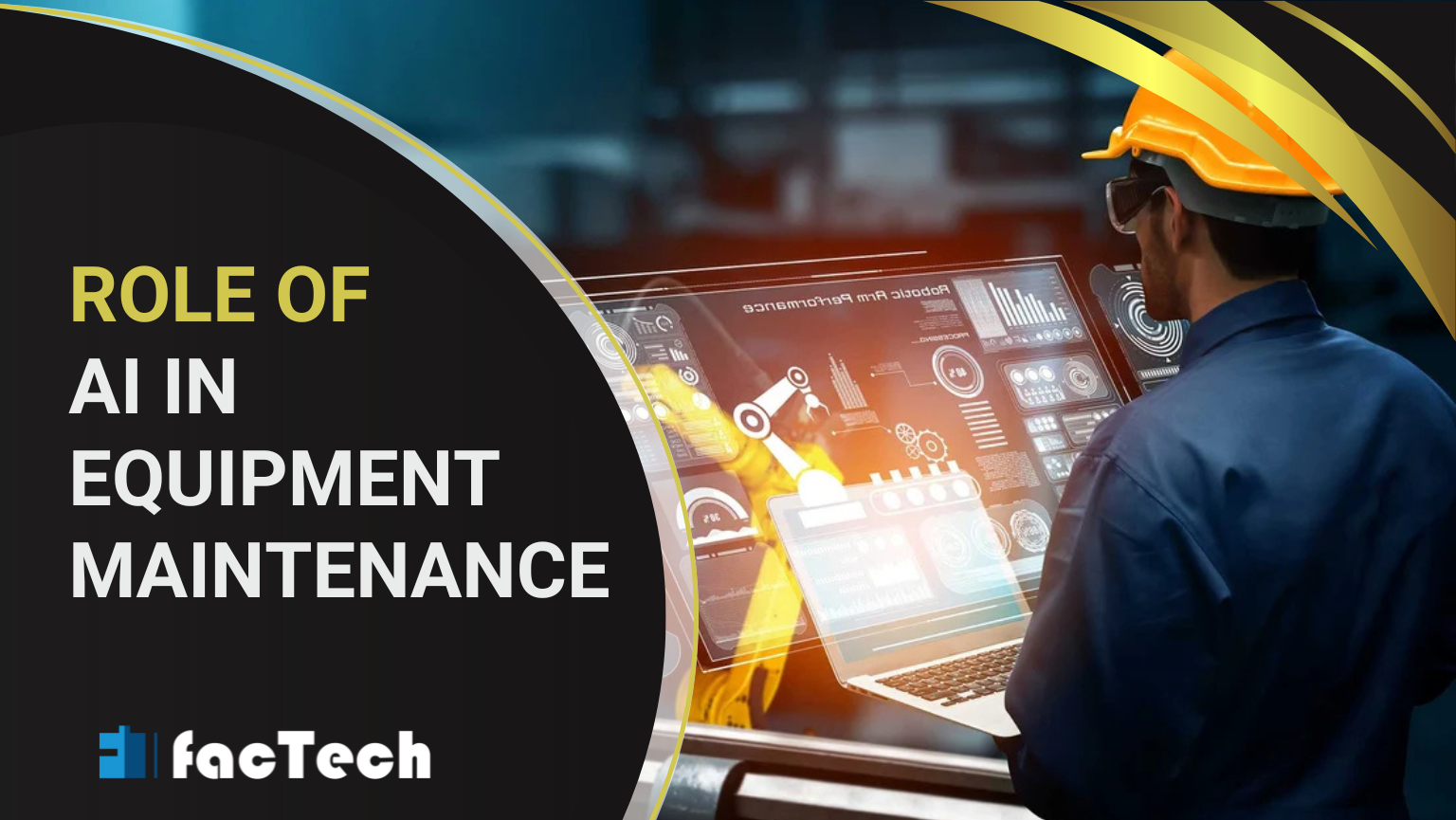Role of AI in Equipment Maintenance
Unexpected industrial technological failures can seriously trouble companies. Should essential machinery be unexpectedly running at half capacity—or none at all—the effects could vary from production declines to total functioning breakdowns. Suppose there existed a means of anticipating the unanticipated? This is the emerging role of AI in equipment maintenance. Companies can gather past and present data to predict errors before they occur and act to lower the risk by applying machine learning (ML) techniques that underlie bigger artificial intelligence systems.
The most advanced technique available to search through enormous volumes of intricate machine data and give the much-needed knowledge to enable maintenance activities is artificial intelligence. It offers real-time machine health insights by means of machine learning algorithms analyzing various types of data from the machines. Appropriately applied, it may identify even minute variations in machine performance and conduct root cause analysis to stop equipment breakdowns and unwanted downtime.
The true worth of artificial intelligence is its capacity to examine vast amounts of diverse types of data together with the intricate machine operations and real-world applications to give superior knowledge of the general condition and performance of industrial assets.

How will AI Impact Equipment Maintenance?
Though in a sci-fi movie it would be fascinating to have sentient robots fix and monitor assets automatically, we are not quite here yet. In maintenance nowadays, artificial intelligence largely concentrates on the organizational elements of maintenance procedures. Let’s go over a few of the maintenance tasks AI is currently enhancing.
PM, or Preventive Maintenance:
Designed to reduce failures by means of a series of routine chores, such as calibrations, inspections, and replacements, PM is a scheduled maintenance technique executed at regular intervals. Although preventative maintenance is usually carried out without artificial intelligence, CMMS systems sometimes make use of it to improve productivity, simplify processes, and automate tasks.
TPM, or Total Productive Maintenance,
TPM seeks to streamline operations by having every employee engage in either minor or significant maintenance activities. This approach can call for all front-line personnel, equipment operators, managers, and engineers. By including more people in maintenance tasks, the concept is to lower resource allocation, therefore enhancing maintenance operations and lowering failure risks.
Easy work assignment and monitoring of maintenance practices made possible by AI technologies and a strong CMMS help maintenance managers.
Predictive Maintenance
Predictive maintenance systems driven by artificial intelligence build on TPM and PM. It forecasts possible difficulties if current conditions continue or how changes could affect operations if the issue is not resolved, therefore transcending simple focus on current concerns or development of schedules based on historical data for continuing maintenance.
By means of a CMMS powered by artificial intelligence and other integrated technologies, facilities could be able to better manage proactive measures addressing problems before they develop.

Key Benefits of AI in Equipment Maintenance
Increases Operational Efficiency:
Artificial intelligence-powered predictive maintenance makes smart analysis of equipment behaviour possible. This helps companies to plan for maintenance, therefore preventing downtime resulting from breakdown. AI also accurately ranks which important maintenance tasks demand an expenditure of resources. This reduces waste and improves the running economy. Including artificial intelligence also advances operational efficiency, data analysis, and more sound decision-making.
Extending Asset’s Lifetime:
AI can match trends and spot degradation while assets and machinery are running, therefore guaranteeing ideal operating conditions. Acting early, before a breakdown starts, helps to maintain machinery in good condition for a longer length of time.
Lowers Unplanned Downtime by:
Like predictive modelling and anomaly detection, artificial intelligence systems employ real-time sensor data to project possible equipment breakdowns. Any aberrant situation causes the predictive maintenance system to automatically send notifications via email, messaging, or dedicated apps together with a visual indication of the problem. Quick response is further facilitated by the display of a visual dashboard produced with technologies such as Power BI or Tableau together with data visualization.
Reduced Operating Costs:
By forecasting the ideal timing for repairs, machine learning methods, including regression analysis and classification algorithm, significantly help to maximize maintenance operations. It reduces operational pauses and helps to avoid expensive breakdowns. Highly used AI-driven features, such as anomaly detection, root cause analysis, and failure pattern recognition, help to identify problems early on. Furthermore, helping to minimize disturbance, maintain seamless operations, and save general costs are digital twins.
Makes Data-driven Decisions:
Using several approaches like neural networks and decision trees, which both execute structured and unstructured data analysis to produce more insightful information, artificial intelligence for predictive maintenance. These facts enable companies in all spheres—including fine-tuning maintenance plans, allocating resources most effectively, and minimizing pointless interventions— to make better decisions.
Improved Security
Many companies first prioritize employee safety, so AI can improve working conditions by guaranteeing safe and correct operation of equipment.
Through extensive data analysis, artificial intelligence (AI) can more accurately forecast when a vital piece of equipment can pose a safety risk, so notifying the maintenance crew to perform required replacements or repairs before an event starts.
Improved Use of Resources
By analyzing enormous volumes of data to identify the most ideal time to complete maintenance activities, conduct inspections, make repairs, or replace equipment, artificial intelligence is enabling manufacturers to get closer to just-in-time maintenance and repair.
By doing this, technicians are concentrating on the most critical chores; supplies like lubricating oil or parts are not wasted, and energy is spent sensibly. All of these elements imply less expense for the company and more conscientious use of the few resources available to be a sustainable member of the society.
This also improves the bottom line of a firm, therefore optimizing profitability as well as strengthening its reputation as a customers-orientated, environmentally conscious corporation consistently delivering quality goods and services.
Enhanced Customer Satisfaction
With growing expectations for excellent quality, quick delivery of goods and services, as well as around-the-clock help across several channels, today’s customer is obviously more demanding than ever.
The advantages of AI in FM can help a business better satisfy all objectives. Reduced downtime follows naturally from AI helping to increase maintenance and dependability. After that, products can be delivered to waiting consumers on schedule.

How can FacTech’s Expertise in AI help you in Excellent Equipment Maintenance?
The CAFM software solution developed by FacTech was designed to assist companies in any capacity to set and meet sensible facilities management objectives. One of the best ways we could do this, we discovered, was giving consumers the chance to save time on basic management chores by means of artificial intelligence.
Unlike other AI-assisted maintenance management systems, our one encourages a digital ecosystem. It lets you control the areas you wish and automatically handle the others. By means of our several connections and customizable data hubs, we enable our customers to develop tailored maintenance routines for their own facilities and management systems.
Contact us for a free demo of how our expertise can help you achieve your business goals to the best.
Contact Us:
: +91 8448869708
: contact@factech.co.in
: 91 SpringBoard C2, Block C, Sector 1,
Noida, Uttar Pradesh 201301, India











